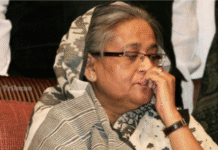Tribunal says superior responsibilty for Al-Badr crimes go to Al-Badr leader
In the verdict against Jamaat leader Ali Ahsan Mohammad Mojaheed, the judges of International Crimes Tribunal-2 talked elaborately about the Al-Badr force, as Mojaheed was a top leader of the organisation that orchestrated the killing of intellectuals.
“Al-Badar [Al-Badr] was created not to maintain peace and public order, rather it is proved beyond reasonable doubt that it had carried out series of untold criminal activities, in furtherance of policy and plan of the Pakistan occupation army in a systematic manner,” said the judgment.
“The members of the organisation were provided training and arms.”
Al-Badr, one of the two wings of Razakars, thus acted as an auxiliary force of the Pakistan army in 1971.
Tribunal Chairman Justice Obaidul Hassan and two other members — Justice Md Mozibur Rahman Miah and judge Md Shahinur Islam — made their observations on Al-Badr while delivering the judgment in the war crimes case against Mojaheed.
“Al-Badar was created under the active vigilance of Jamaat-e-Islami and Pakistani occupation army, and it may be unerringly concluded that it acted as an ‘auxiliary force’ for ‘operational’, ‘static’ and ‘other purposes’ of the occupation armed force”.
About the reason behind Al-Badr’s creation, the judgment said, “Of course, the objective was not to guard the lives and properties of civilians.
“The Al-Badar force had acted in furtherance of policy and plan of Pakistani occupation army and in so doing it had committed atrocities in a systematic manner against the unarmed Bengali civilians throughout the territory of Bangladesh in 1971.”
Pro-liberation civilians, intellectual groups and the Hindu community were their key targets.
“That is to say, Al-Badar was a ‘paramilitary arm’ to the Pakistan Army and it acted as its ‘death squad’, in furtherance of policy and plan to annihilate the Bengali pro-liberation civilians, nationalist intellectuals, civilians belonging to Hindu community and freedom fighters (whom they called miscreants)”.
On the basis of witness’ information and documents, the judgment said Razakars and Al-Badr men were given salaries and allowances by the then East Pakistan government, and the Al-Badr men were provided with arms under the supervision of that government.
“These two facts are indicative to conclude that the Al-Badr force too was an ‘auxiliary force’ as it acted for ‘operational’ and ‘static’ purpose of the Pakistani occupation army,” it said.
The judgment said Mojaheed was quite aware of Al-Badr’s criminal activities to annihilate selected intellectuals.
“Mujahid [Mojaheed], who was in a superior position (President) of ICS which transformed into Al-Badar was aware of consequence of his act and conduct that substantially encouraged, endorsed, approved, provided moral support to the Al-Badr men in committing the intellectuals killing,” it said.
The judgment said Mojaheed’s authoritative position in Al-Badr was a “fair indicia” that he had “effective control and ability” over the members of Al-Badr, the “action section” of Jamaat.
He could not be relieved of the responsibility of the planned crimes by Al-Badr men with whom he had a “relationship”, observed the tribunal.
Mojaheed’s act, conduct, and inflammatory and provocative speech had substantial impact on Al-Badr, a criminal organisation, in carrying out its activities and “operation” between December 10 and 16, 1971 to kill selected intellectuals in Dhaka city, it added.
Source: The Daily Star









